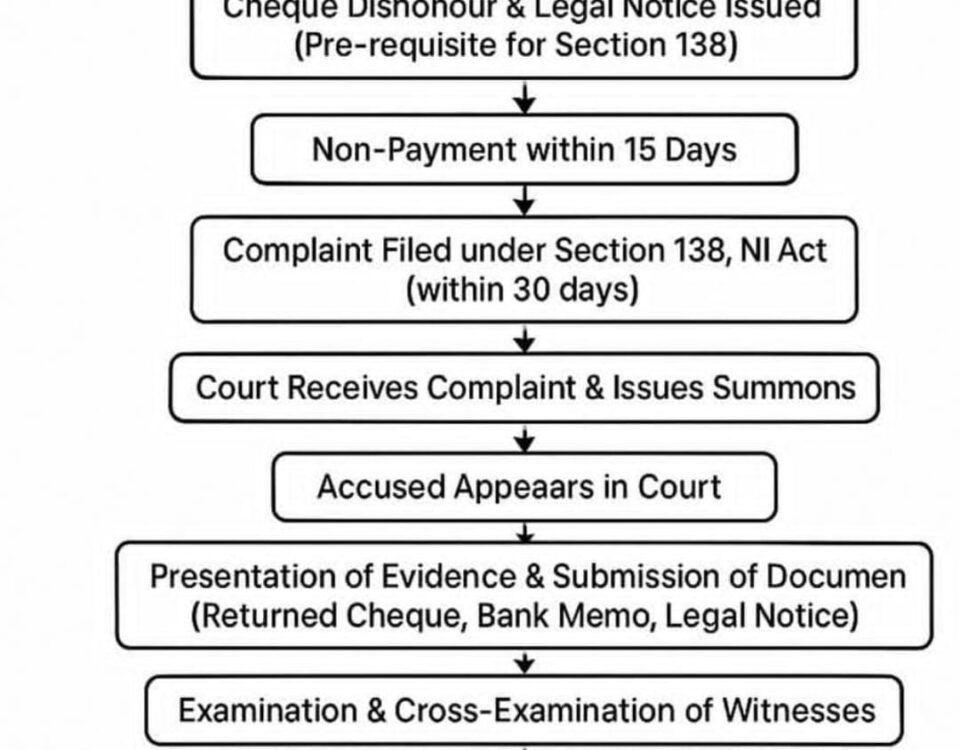- Top-rated Best Lawyer in Noida
- +91 96161-66166
- [email protected]

A Detailed Exploration of the Civil Cases Process
January 31, 2025
Divorce Lawyer in Noida – Expert Legal Assistance
February 5, 2025Criminal Cases Proceeding & Steps Involved in India
The criminal justice system can be a daunting and perplexing arena, especially for those who find themselves directly involved in a case. Whether you're a defendant, a victim, or someone trying to grasp the intricacies of the system, navigating through criminal law requires a certain level of understanding. Criminal cases are not only about enforcing the law but also about ensuring that justice is served while protecting the rights of both the accused and the victim. In this blog, we’ll take an in-depth look at the journey of a criminal case, the different types of crimes, common defenses, punishments, and the crucial role of legal representation. With this knowledge, you can better understand how the criminal justice system works and what to expect when involved in a criminal case.
What is a Criminal Case?
A criminal case is essentially a legal proceeding in which the government (represented by the prosecution) accuses a person or entity of committing a crime. These cases are brought to court by the state, and the goal is to prove whether the accused is guilty or innocent. Unlike civil cases, where one individual sues another for damages or wrongful actions, criminal cases are meant to address violations against public law and order. Criminal charges can vary in seriousness, from minor offenses such as petty theft to major felonies such as murder or fraud. In criminal law, the state seeks to punish and deter criminal behavior while maintaining public safety.
The role of the prosecution in a criminal case is to prove beyond a reasonable doubt that the defendant committed the crime, while the defense attorney works to show that the prosecution’s case is insufficient or flawed. If found guilty, the accused faces legal consequences ranging from fines and probation to lengthy prison sentences or even the death penalty, depending on the crime's severity.
Steps in a Criminal Case
The criminal case process is detailed and involves multiple stages, each playing an important role in ensuring that justice is served. The first stage is typically an investigation, where law enforcement officers collect evidence, interview witnesses, and gather facts to determine if a crime has occurred. Investigators may use surveillance, forensic analysis, and other methods to piece together the story of the alleged crime. If enough evidence is found, the accused is arrested. However, an arrest can only happen when probable cause exists, meaning that the police have reasonable grounds to believe that the accused committed the crime.
Once arrested, the accused is taken to court for an arraignment, a formal hearing where charges are read, and the defendant is informed of their legal rights. The defendant will enter a plea at this stage: guilty, not guilty, or no contest. If they plead not guilty, the case moves forward, and a trial date is set. In some cases, a defendant may be offered a plea bargain, where they agree to plead guilty in exchange for a lighter sentence or lesser charges.
If the case goes to trial, both the prosecution and defense will present their arguments, evidence, and witnesses. The defense may argue that the prosecution has failed to prove their case, or they may offer evidence to show that the defendant is innocent or acted in self-defense. The trial culminates with a verdict, where the judge or jury decides whether the defendant is guilty or not. If convicted, the judge will then impose a sentence, considering factors like the severity of the crime, the defendant's criminal history, and any mitigating circumstances.
Have a question?
Ask the experts.
Marriage as an institution has undergone various changes and while it may turn out to be a life-long companionship for most, it simply is an excruciating ordeal for some. To accommodate the changing facets of the institution of marriage, the law has introduced amendments from time to time. Today, divorce is no longer a taboo and is rapidly being resorted to dissolve a marriage which no longer serves its purpose.
Write us a message
Get in touch
- LAWYER IN NOIDA
TS-1103, 11th Floor, Office Tower, Galaxy Blue Sapphire Plaza, Noida Extension, Greater Noida West, Uttar Pradesh-201308 (Near Gaur City Mall)
Types of Criminal Offenses
Criminal offenses are divided into several categories, each varying in the severity of punishment and legal consequences. These categories help define how the legal system addresses different types of crimes. Among the most common types of criminal offenses are property crimes, violent crimes, drug offenses, and white-collar crimes. Property crimes involve the theft, destruction, or vandalism of someone else's property. Common property crimes include burglary (breaking into a building with the intent to commit theft), larceny (stealing property), and arson (setting fire to a building).
Violent crimes involve harm or the threat of harm to a person. These crimes include assault, battery, robbery, and murder. Violent crimes are typically treated more seriously by the justice system, and penalties for these offenses can be severe. For example, a charge of first-degree murder can result in a life sentence or the death penalty, depending on the jurisdiction.
Drug crimes are another significant area of criminal law. Drug-related offenses can involve the possession, trafficking, manufacture, or distribution of illegal substances. Drug crimes can be charged as felonies or misdemeanors, depending on the type and quantity of the drugs involved. In some cases, an individual may face harsher penalties if the crime involved minors or took place near schools or other sensitive areas. Lastly, white-collar crimes are non-violent crimes typically committed by individuals in positions of trust, such as business executives, government officials, or professionals. These crimes often involve financial fraud, embezzlement, insider trading, or identity theft. Despite the lack of violence, white-collar crimes are taken very seriously, as they can have wide-reaching impacts on victims and society.
Defenses in Criminal Cases
Defending a criminal case can be as complex as prosecuting it. The accused has the constitutional right to defend themselves in court, and various defense strategies can be used, depending on the nature of the case. One of the most common defenses is the claim of innocence, where the defense argues that the defendant did not commit the crime. The defendant may provide alibi evidence, such as witnesses or surveillance footage, to prove they were somewhere else at the time of the alleged crime.
Another common defense is self-defense, where the defendant argues that they used force to protect themselves from harm. In such cases, the defendant must demonstrate that their actions were proportional to the threat faced. For instance, using lethal force in response to a verbal argument may not be justified under self-defense laws.
In some cases, insanity or mental illness may be used as a defense. Here, the defendant claims that they were unable to understand the nature of their actions or the consequences due to a mental disorder. This defense can be complicated, as the defendant typically undergoes psychiatric evaluations to assess their mental state at the time of the crime.
Criminal Punishments
Punishments for criminal offenses vary widely depending on the severity of the crime, the defendant's criminal history, and the laws in the jurisdiction where the crime was committed. Punishments can range from fines and community service for minor offenses to prison sentences and even the death penalty for the most serious crimes.
For less severe crimes such as misdemeanors, individuals may be sentenced to probation, where they are allowed to live in the community but must comply with certain conditions, such as regular check-ins with a probation officer or participation in counseling. Felonies, which are more serious crimes, typically carry much longer prison sentences and may include parole eligibility after a certain amount of time served.
The Importance of Legal Representation
One of the most crucial factors in navigating a criminal case is securing legal representation. Criminal law is intricate, and the outcome of a case can be life-altering. A skilled criminal defense lawyer plays an essential role in ensuring that the defendant's rights are protected throughout the process. They will examine the evidence, challenge the prosecution's case, and present a defense strategy that gives the defendant the best chance for a favorable outcome.
Experienced attorneys also provide guidance on whether to accept a plea bargain or take the case to trial. In many situations, a plea bargain may be beneficial, but it’s essential that the defendant fully understands the consequences of such an agreement. A lawyer’s expertise ensures that the defendant does not face unnecessary risks or penalties due to ignorance of the law.
Conclusion
Criminal cases are far from simple, and the journey through the legal system can be long and complicated. From the moment a person is accused of a crime to the final sentencing, each step in a criminal case is crucial in ensuring that justice is served. Whether you're facing charges or just looking to understand the system, this blog has covered the essential aspects of criminal law, including the steps in a criminal case, types of offenses, possible defenses, and the importance of legal representation. If you or someone you know is involved in a criminal case, seeking the advice of a competent attorney is paramount to navigating the legal maze and achieving the best possible outcome.
The criminal justice system can be a daunting and perplexing arena, especially for those who find themselves directly involved in a case. Whether you’re a defendant, a victim, or someone trying to grasp the intricacies of the system, navigating through criminal law requires a certain level of understanding. Criminal cases are not only about enforcing the law but also about ensuring that justice is served while protecting the rights of both the accused and the victim. In this blog, we’ll take an in-depth look at the journey of a criminal case, the different types of crimes, common defenses, punishments, and the crucial role of legal representation. With this knowledge, you can better understand how the criminal justice system works and what to expect when involved in a criminal case.

